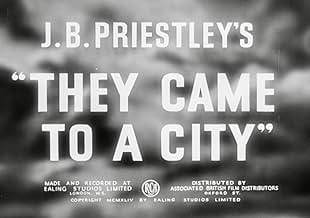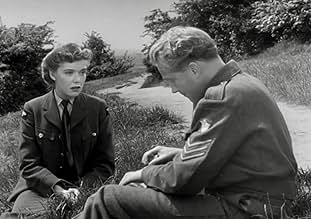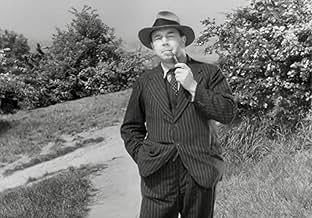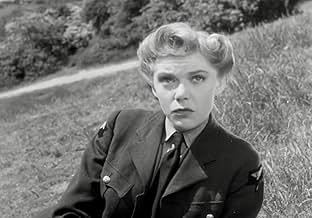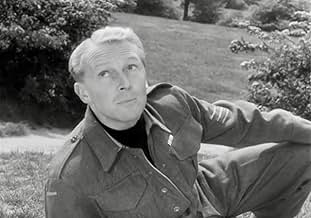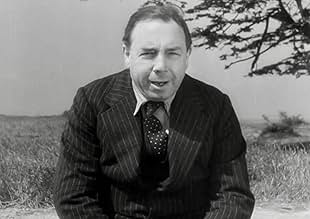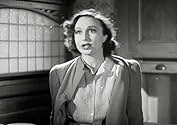Ajouter une intrigue dans votre langueAdapted from a J.B. Priestley play with many of the original actors. The tale of various people who have come to live in an "ideal" city and their hopes and reasons for doing so.Adapted from a J.B. Priestley play with many of the original actors. The tale of various people who have come to live in an "ideal" city and their hopes and reasons for doing so.Adapted from a J.B. Priestley play with many of the original actors. The tale of various people who have come to live in an "ideal" city and their hopes and reasons for doing so.
- Réalisation
- Scénario
- Casting principal
Mabel Terry-Lewis
- Lady Loxfield
- (as Mabel Terry Lewis)
Fanny Rowe
- Philippa Loxfield
- (as Frances Rowe)
Brenda Bruce
- WAAF
- (non crédité)
Ralph Michael
- Sergeant Jimmy
- (non crédité)
J.B. Priestley
- J.B. Priestley
- (non crédité)
Johnnie Schofield
- Bert the Barman
- (non crédité)
Avis à la une
The main title actually says 'J. B. Priestley's They Came to a City', and the film constitutes the second of three brief wartime flirtations with fantasy by Ealing Studios.
Coming late in the war when enlightened opinion was already contemplating what was to come next, the ideals it expressed had already found voice in the Boulting Brothers short 'Dawn Guard' and thematically owed a lot to Sutton Vane's 'Outward Bound', James Hilton's 'Lost Horizon' and Priestley's own 1937 fantasy 'I Have Been Here Before'; while the striking production design seems to show the influence of German silent cinema.
Beginning and ending with the genial figure of Mr Priestley ambling on and off, it's not for all tastes, but is certainly quite unlike any other British film before or after.
Coming late in the war when enlightened opinion was already contemplating what was to come next, the ideals it expressed had already found voice in the Boulting Brothers short 'Dawn Guard' and thematically owed a lot to Sutton Vane's 'Outward Bound', James Hilton's 'Lost Horizon' and Priestley's own 1937 fantasy 'I Have Been Here Before'; while the striking production design seems to show the influence of German silent cinema.
Beginning and ending with the genial figure of Mr Priestley ambling on and off, it's not for all tastes, but is certainly quite unlike any other British film before or after.
Not exactly highly entertaining but it's not supposed to be entertaining as it's a comparison of posh rich people to poor ones.
Unsurprisingly the rich posh ones are not keen on a society where all are equal so the privileged positions that they currently enjoy would be lost. Eighty years later and nothing has changed as the rich continue to get richer and the poor get poorer.
My favourite character was the washerwoman who held the film together with her comments.
The set must have been very cheap to construct as it seemed to have been made of plywood painter to resemble stone.
Worth a watch but don't expect any excitement like a car chase for example.
Unsurprisingly the rich posh ones are not keen on a society where all are equal so the privileged positions that they currently enjoy would be lost. Eighty years later and nothing has changed as the rich continue to get richer and the poor get poorer.
My favourite character was the washerwoman who held the film together with her comments.
The set must have been very cheap to construct as it seemed to have been made of plywood painter to resemble stone.
Worth a watch but don't expect any excitement like a car chase for example.
A British drama; A story about how people might live if they were presented with the opportunity to live in a utopia, an "ideal" city, exploring their hopes and reasons for doing so. This is an eloquent, stagy allegory based on a play of the same title by J. B. Priestley. The direction, acting, and photography are all good, apart from occasional fits of overcooked melodrama within its bounds. It is an intelligent screenplay, but the tale within it lacks cinematic dimension with long, static sequences of dialogue; the audience is robbed of the pictorial element of what is hinted at about the mysterious settlement. Tied to this is a quite heavy political slant in the script, which is left for the viewer to accept as a task rather than for them to explore by diversion; the audience is locked out. Though the theme of universal friendship is explored well.
This is a very unusual film as its a 1940s surrealist one made by Ealing Studios and is simply unknown by the majority of the public. Trust Talking Pictures TV to bring it back to the public consciousness in 2024.
I was attracted to this film as I have a soft spot for old movies which have an air of the surreal, as its always interesting to see how fantasy elements are executed without the crux of CGI and computing power. A great example of a film that does this well is A Matter Of Life And Death.
The current film however is not on the same level, as it has less of the fantasy elements of Life And Death. It is basically a film about nine individuals from the social ranks of British society who are granted the opportunity to enter into a Utopian ideal city. The majority of the film is each character voicing their reasons of whether they have decided to stay in this city or return back to the previous lives. Where the movie falls flat is that its basically a communist propaganda reel in which the haves are evil and the have nots are virtuous. The problem with the author of this story is nobody seems to have told him that Utopia's simply don't work. People being as they are, so the entire notion of people deciding on whether to stay is irrelevant. To argue that point doesn't matter because its a movie makes no sense, because the film is an obvious social commentary. Of course its the bad people who don't want anything to do with the Utopia and the good people who do. More propaganda. But unless the author can come up with the magical way that an entire city can run where everybody is happy all the time and there are no problems because everyone works together, its a moot point to pour disdain on people who would refuse to live there. Maybe its because they know its all an unobtainable fantasy. The far left have always had this fantasy of a Utopia which they think would happen if everybody did what they said, and this movie is a great example of such flawed and simplistic reasoning. Its obvious from the ratings that many people either found this boring or recoiled at the communist slant of the narrative. Its an interesting watch for how strange it is, its simply not a great movie and its political angle comes across as extremely naive, maybe the collapse of communist societies hadn't happened yet.
I was attracted to this film as I have a soft spot for old movies which have an air of the surreal, as its always interesting to see how fantasy elements are executed without the crux of CGI and computing power. A great example of a film that does this well is A Matter Of Life And Death.
The current film however is not on the same level, as it has less of the fantasy elements of Life And Death. It is basically a film about nine individuals from the social ranks of British society who are granted the opportunity to enter into a Utopian ideal city. The majority of the film is each character voicing their reasons of whether they have decided to stay in this city or return back to the previous lives. Where the movie falls flat is that its basically a communist propaganda reel in which the haves are evil and the have nots are virtuous. The problem with the author of this story is nobody seems to have told him that Utopia's simply don't work. People being as they are, so the entire notion of people deciding on whether to stay is irrelevant. To argue that point doesn't matter because its a movie makes no sense, because the film is an obvious social commentary. Of course its the bad people who don't want anything to do with the Utopia and the good people who do. More propaganda. But unless the author can come up with the magical way that an entire city can run where everybody is happy all the time and there are no problems because everyone works together, its a moot point to pour disdain on people who would refuse to live there. Maybe its because they know its all an unobtainable fantasy. The far left have always had this fantasy of a Utopia which they think would happen if everybody did what they said, and this movie is a great example of such flawed and simplistic reasoning. Its obvious from the ratings that many people either found this boring or recoiled at the communist slant of the narrative. Its an interesting watch for how strange it is, its simply not a great movie and its political angle comes across as extremely naive, maybe the collapse of communist societies hadn't happened yet.
Lovely piece about assorted people who discovered a happy land far far away - and some found it happier than others. But as noted elsewhere, the Utopia is portrayed without any explanation of how we got there. As another reviewer says, it captured the mood of the times. That mood produced the Attlee government - and after six years of it, it took another 13 before Labour got in again - and Harold Wilson had the sense not to promise Utopia. Unfortunately, The comparison with Lost Horizon is very apt, but Shangri-La doesn't work without it's supernatural elements - which unfortunately we don't possess.,
Le saviez-vous
- AnecdotesFinal film of Mabel Terry-Lewis.
- Citations
Alice Foster: I never thought there *could* be a place as good as this.
- ConnexionsFeatured in Sosialismi (2014)
- Bandes originalesMusic selected from The Divine Poem
Music by Aleksandr Skryabin (as Scriabin)
Played by The London Philharmonic Orchestra
Conducted by Ernest Irving
Meilleurs choix
Connectez-vous pour évaluer et suivre la liste de favoris afin de recevoir des recommandations personnalisées
Détails
- Durée1 heure 18 minutes
- Couleur
- Rapport de forme
- 1.37 : 1
Contribuer à cette page
Suggérer une modification ou ajouter du contenu manquant

Lacune principale
By what name was They Came to a City (1944) officially released in India in English?
Répondre
